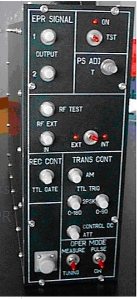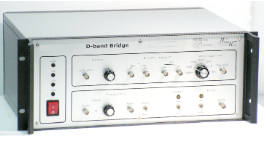ELVA-1 mm-wave Bridges for EPR Spectrometers
ELVA-1 produces mm-wave bridges and components for EPR spectrometers. Lots of scientific laboratories in the world use ELVA-1’s products in their EPR experiments: Cornell University, USA Free University, Germany Osnabrueck University, Germany Weizmann Institute, Israel CW: CW + AM (amplitude modulation) N Specs Parameters W-band D-band 1 Central frequency 95 GHz 130 GHz 2 Central frequency stability 30 kHz/hour…...
See full specification tab below or
Contact us for assistanceSee full specification tab below or
ELVA-1 produces mm-wave bridges and components for EPR spectrometers. Lots of scientific laboratories in the world use ELVA-1’s products in their EPR experiments:
- Cornell University, USA
- Free University, Germany
- Osnabrueck University, Germany
- Weizmann Institute, Israel
CW: CW + AM (amplitude modulation)
| N | Specs Parameters | W-band | D-band |
| 1 | Central frequency | 95 GHz | 130 GHz |
| 2 | Central frequency stability | 30 kHz/hour (using DRO) | 30 kHz/hour (using DRO) |
| 3 | Operating frequency range (any fixed frequencies for DROs and tunable frequencies for VCO) | 400 MHz (95 GHz+/-0.2 GHz) | 400 MHz (130 GHz+/-0.2 GHz) |
| 4 | Frequency stability | 10-6 per °C | 10-6 per °C |
| 6 | Max mm-wave power | Up to 250 mW | Up to 50 mW |
| 7 | Power stability | 0.02 dB per °C | 0.02 dB per °C |
| 8 | FM noise @ 10 kHz | -100 dBc/Hz max | -100 dBc/Hz max |
| 9 | AM noise @ 10 kHz | -140 dBc/Hz max | -140 dBc/Hz max |
| 10 | Attenuation of output power | 60 dB | 50 dB |
| 11 | Min switching time of amplitude modulation of output signal (10 % to 90 % and 90% to 10 % power level) | 5 ns (5*10-9 sec) max, 3-4 ns typical | 5 ns (5*10-9 sec) |
| 12 | Noise figure of receiver section | 12 dB | 14 dB |
| 13 | Max gain of receiver section | 50 dB | 50 dB |
| 14 | Receiver section bandwidth | 200 MHz | 200 MHz |
Pulse: CW + AM + PM 0-90 deg., 0-180 deg. (phase modulation)
| N | Specs Parameters | W-band | D-band |
| 1 | Central frequency | 95 GHz | 130 GHz |
| 2 | Central frequency stability | 30 kHz / hour | 40 kHz / hour |
| 3 | Operating frequency range | 400 MHz (95 GHz+/-0.2 GHz) | 400 MHz (130 GHz +/-0.2 GHz) |
| 4 | Spectrum width @ -3 dB level | <1 kHz | 1 kHz |
| 6 | Max power | Up to 250 mW | Up to 50 mW |
| 7 | Changing of pulse output power | 60 dB | 50 dB |
| 8 | Changing of output power of CW channel | 120 dB | 100 dB |
| 9 | Min duration of output pulses at amplitude modulation of output power | 10 ns (10-8 sec) | 10 ns (10-8 sec) |
| 10 | Min switching time by 2PSK modulation of output signal | 5 ns (5*10-9 sec) | 5 ns (5*10-9 sec) |
| 11 | Accuracy of 180 deg phase shift keeping for 2PSK | 1 degree | 1 degree |
| 12 | Microwave power suppression during a pause between pulses | 100 dB | 100 dB |
| 13 | Switching time up to max suppression level | <10 ns | 10 ns |
| 14 | Noise figure of receiver section | 12 dB | 14 dB |
| 15 | Max gain of receiver section | 50 dB | 50 dB |
| 16 | Receiver section bandwidth | 200 MHz | 200 MHz |
| 17 | Total phase drift | 5 degrees/15 min | 5 degrees/15 min |
MM-wave frequency multiplier and fast (< 5 ns) phase and amplitude modulators below are key
parts of high stable low phase noise mm-wave source for EPR spectrometer.


